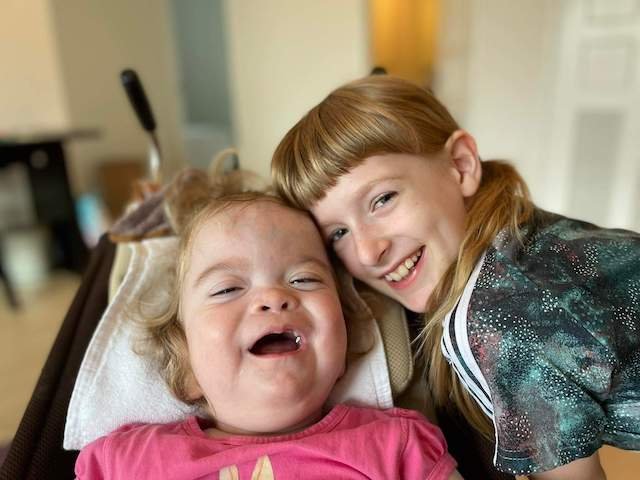Kelley and Ryan's Story
/RG’s Patient Advocacy Team is an initiative of Rare Genomics Institute (RG) that aims to connect rare disease patients to resources, networks, and sequencing projects, in order to help find hope for a cure. The patient advocacy team is an ongoing program offered to all rare disease patients. To contact us, click here: https://www.raregenomics.org/contact-us
Kelley discovered Rare Genomics when searching for more information about TFE3-Associated Neurodevelopmental Disorder (TFE3), which is featured on our rare disease list (https://www.raregenomics.org/rare-disease-list). She graciously shared her story with us through a virtual call with the hope to empower parents of children with rare diseases.
Ryan entered this world spontaneously, 5 weeks earlier than expected. At the time, her mother Kelley had been living in Udon, Thailand with her husband and two other children.
At birth, Ryan was diagnosed with bilateral sensorineural hearing loss and an umbilical hernia. A few weeks later, she was diagnosed with macroglossia and an oversized liver. After piecing together a puzzle of symptoms, including Ryan’s spontaneous birth, her pediatrician made the diagnosis of Beckwith Wiedemann Syndrome (BWS) at three months. Kelley was relieved to have a diagnosis. With a name to lead the way, this initial answer pointed their family towards further work-up, medical research papers Kelley could read to learn more, and treatment options.
However, Ryan’s story did not end with BWS. She continued to be in pain for the first 1.5 years of her life because there were several other symptoms that were unaccounted for in the initial BWS diagnosis, and therefore not addressed. With many more doctor’s appointments and Kelley’s determination to find answers, Ryan was eventually diagnosed with adrenal insufficiency, growth hormone deficiency, hypoglycemia, epilepsy, hydrocephalus, and central hypothyroidism. Once the hydrocephalus was treated with a ventriculoperitoneal shunt (VPS) and her epilepsy was treated with seizure medications, Ryan started to show improvement with her pain. Kelley noticed that she was smiling more.
However, it was clear to Kelley that Ryan was still experiencing pain. Around 8 months, Ryan was no longer feeding and began displaying a swallowing deficiency. Kelley faced a language barrier living in a foreign country, and struggled to communicate to the doctors that Ryan’s feeding issues were severe and required intervention. Although Kelley was trained in speaking and understanding Thai, the area of medical Thai was unfamiliar to her. To navigate the language barrier and receive healthcare that was more suited to Ryan’s needs, Kelley traveled to Bangkok frequently for a week full of appointments.
After connecting with geneticists and obtaining whole exome sequencing, Ryan was diagnosed with TFE3-Associated Neurodevelopmental Disorder (TFE3) in December 2021. Many of the physical features that are hallmarks of TFE-3, including large ear lobes, coarse facial features, and skin hyperpigmentation, were displayed by Ryan. With this diagnosis also came with a justification for Ryan’s GI symptoms, including her slow eating and constipation.
She was the 21st patient in the world to be diagnosed with TFE3 disorder. At this time, little is known about TFE3 so Ryan cannot benefit from the current research. However, she is a candidate to contribute to future research. Kelley says, “If we can assist in learning more about and treating TFE3, then I would like Ryan to participate in that.” Kelley found Rare Genomics while searching the web for more information on TFE3. Once she discovered our rare disease list, she sent us a brief synopsis of Ryan’s journey and soon was connected to one of our patient advocates.
Our patient advocate at Rare Genomics Institute (RG) connected Kelley with “Patients Know Best (PKB)”, a UK healthcare platform that puts patients at the center of their health care records and management. Kelley uploaded Ryan’s variant to several self-reportable databases, including the Rare Genomics Project and the Matchmaker Exchange. At this time, we are working with Kelley to help bring greater awareness to rare diseases, including TFE-3, and furthering scientific discovery around Ryan’s specific variant.
Kelley described the emotion as calming when Ryan was diagnosed with TFE3 because she found that some of the other children “looked like Ryan.” She soon joined a Facebook group with other TFE3 families, of which 8 individuals have an official TFE3 diagnosis.
Since receiving the new diagnosis, Kelley and her family have decided to return to the United States in the coming months. Here, Ryan will have access to more resources and Kelley will no longer face a language barrier in healthcare settings. Kelley’s family members who live in Texas can also provide support. While obtaining and affording special needs healthcare is a new challenge, one which may put Ryan on a waitlist that will not guarantee covered care until she is a teenager, Kelley is committed to continue to pursue what will be best for Ryan.
Ryan is now two years old and her rare disease journey continues. Kelley’s advice to rare disease parents is: “In my limited experience, [since] I am only 2 years in, each parent responds and processes information so differently. For me it was helpful in affirming to receive a genetic diagnosis of a rare disease. However it makes you feel, be aware of that. Do your best to pursue what will help you care for your child best. Take advantage of resources because you can burn out.”





